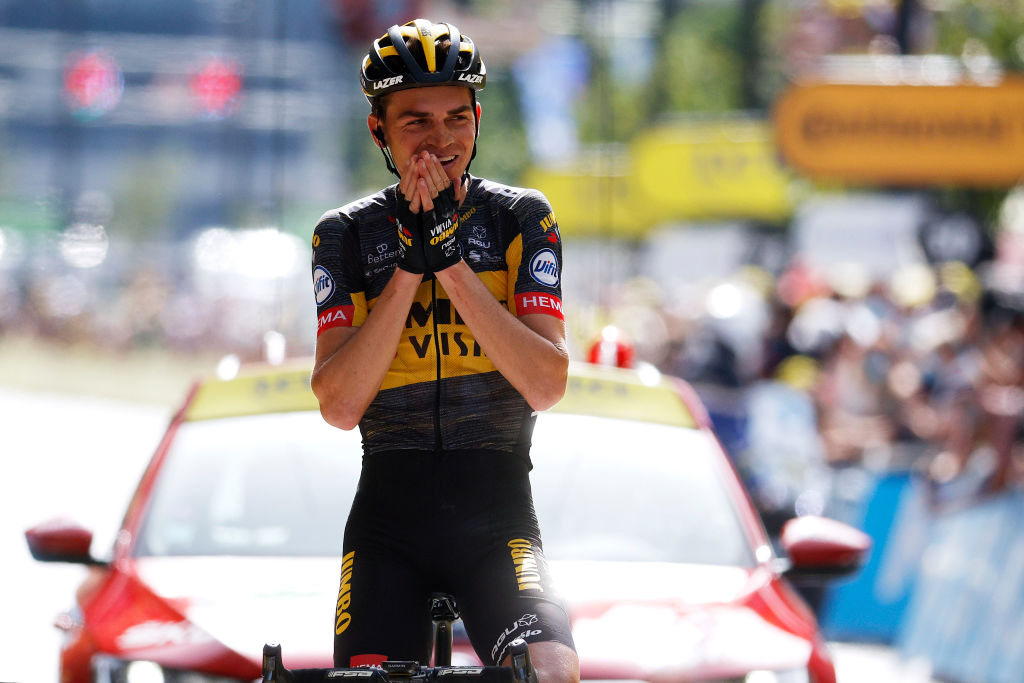Sepp Kuss ends 10-year-drought on American Tour de France stage wins
Jumbo-Visma rider solos home first on training roads in Andorra

It’s been a long time coming, but Sepp Kuss (Jumbo-Visma) finally gave the USA its first Tour de France stage win in a decade as he soloed home in Andorra on Sunday.
Kuss’ victory could not have been more different than the USA’s previous success, a bunch sprint victory for Tyler Farrar in the 2011 Tour’s first week in the flatlands of western France.
But the 26-year-old was equally delighted about it for sure, flinging his sunglasses away as he celebrated the biggest win of his career in central Andorra and claimed Jumbo-Visma’s second mountain stage win in five days into the bargain.
“I didn’t know that statistic,” Kuss, already a stage winner in the Vuelta a España and in the Critérium du Dauphiné, told reporters when informed he had ended a 10-year drought on American wins.
“I think over the last years we’ve seen a lot more US riders coming through at the biggest, highest level. It was cool to be in the break with Neilson [Powless-EF Education-Nippo] as well, he’s riding super strong, he’s always in the breakaways. It’s been a really good season this year for Brandon McNulty [UAE Team Emirates] and Lawson Craddock [EF Education-Nippo] too.
“We don’t have the powerhouse resources like some other countries but I think with the riders we have we’re all motivated. And we all have a different skillset so it’s an exciting time for us.”
As an Andorra resident, the Colorado native said he knew the final climb of the day, the Beixalis, very well, to the point where he actually doesn’t train on it all that often because he knows it’s so hard. But with that difficulty in mind, he added that, "I also knew if I went there, it would be hard enough to get a gap and try and hold it to the finish.”
Get The Leadout Newsletter
The latest race content, interviews, features, reviews and expert buying guides, direct to your inbox!
Previously, Kuss could also count on the invaluable assistance of two teammates, Wout Van Aert, the Ventoux winner, and former Tour de France podium finisher Steven Kruijswijk, in the massive break that led out front. “They both did a lot of work for me and after that, you know you have to finish the job,” Kuss said.
Kuss’ success also gives Jumbo-Visma another reason to be cheerful after their first week ended in disaster as Primož Roglič had to abandon due to injuries. Following Van Aert’s triumph on the Ventoux, the Dutch team also have Jonas Vingegaard well placed in the overall classification, third after stage 15.
Asked to explain why Jumbo had opted to have three riders in the break and nobody except sprinter Mike Teunissen staying with Vingegaard, Kuss said, “with only five guys [in the race] you have to be a bit more creative. Once all three of us were there, we could save energy and we could discuss among ourselves which one of us was going to drop back and support Jonas.
“In the end, we managed a stage win and also team tactics, but not the traditional way maybe.”
Having made the most of his prior knowledge of the climb, Kuss' familiarity with the descent stopped him from getting nervous at the fact he was being chased by a star racer of the calibre of Alejandro Valverde (Movistar), he said. The hardest part of his breakaway, he added, came when the road flattened out and he found himself facing a headwind in the last three kilometres. But he still made it.
After his own moment of glory, from here to the end of the Tour de France, Kuss’ objectives will centre fully on supporting Vingegaard through to Paris.
“I’m lost for words, to be honest,” he said. “I’d been suffering a lot in the first part of the Tour and I didn’t feel I had spice in my legs. But I knew it was finishing where I live and finally I got some good legs again.”
As for when he made his stage winning move on the Beixalis, rather than planning it in terms of steepness or a particular corner, Kuss had a very original explanation. He said that he had timed his attack to be sure that he would see his girlfriend and her family on the ascent.
She had sent him a message to indicate their exact placing, he explained, and had thought, “OK, for sure I need to do something before then, so I can take the time to see them. It was really special to have them supporting me on a day like this.”
And being able to take the win, of course, just made it even better.
Alasdair Fotheringham has been reporting on cycling since 1991. He has covered every Tour de France since 1992 bar one, as well as numerous other bike races of all shapes and sizes, ranging from the Olympic Games in 2008 to the now sadly defunct Subida a Urkiola hill climb in Spain. As well as working for Cyclingnews, he has also written for The Independent, The Guardian, ProCycling, The Express and Reuters.
